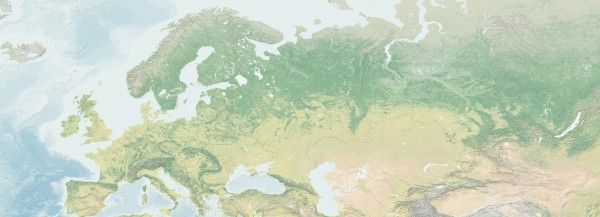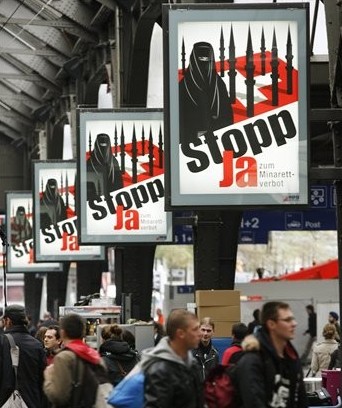The European minaret-missile threat
Bigotry is on the rise in “the westerly excrescence of the continent of Asia.”
That unpoetic but topographically-precise description of Europe comes from the Oxford archeologist, Barry Cunliffe.
Whenever voices declaring that European culture is under threat are at their most strident, it’s always worth remembering the actual nature of Europe’s physical form.

As a continent it is nothing more than a malleable contrivance with its ambiguous, historically shifting eastern edge. As a result, it is and always has been, an ethnic and cultural melting pot.
Thus the irony when Europe’s self-appointed protectors take a firm stand in the name of its defense: they so often lack a real appreciation for the very thing to which they have pledged their allegiance.
Why is it that the people who most easily become possessed by ideas about cultural purity are themselves so often culturally impoverished?
Because culture in its richness and complexity is not the real issue.
This is about how individuals respond to the other.
Does the unfamiliar prompt interest and curiosity?
Or does it provoke fear?
Fear in response to the other says more about the fearful than it says about the objects they fear.
The fear of the foreign is at its root a fear of becoming foreign. It is a fear of becoming a stranger in one’s own land.
* * *
 In the latest outbreak of European xenophobia, the minaret has become a missile in a campaign to ban their construction — that is, the construction of minarets, not missiles.
In the latest outbreak of European xenophobia, the minaret has become a missile in a campaign to ban their construction — that is, the construction of minarets, not missiles.
This is a curious iconic transformation. Is the Swiss People’s Party suggesting that Switzerland, in which currently there are only four minarets, is at risk of becoming a missile-minaret launching pad threatening the rest of Europe with Islamization? (After all, their posters depict missile-minarets ready for launch — not incoming missile-minarets about to explode.)
By Sunday it became apparent that Swiss voters had little interest in dissecting the visual absurdity of the campaign poster — a majority seemed to have bought the implicit message: Islam = violence, death and destruction.
The campaign’s final week of fear-mongering managed to raise support for the ban from 37% up to 57.5%, with passage in the majority of cantons meaning that a constitutional amendment will follow.
As The Guardian reported:
The controversial referendum on Sunday, accompanied by a prohibition campaign denounced as racist and in violation of human rights, is the latest tussle in Europe over the limits of multiculturalism and immigrant lifestyles.
Pushed by anti-immigrant rightwing populists, it has triggered months of debate in a country that uses direct democracy for single-issue politics. The referendum has turned into much more than a vote on architecture and urban planning.
“The minaret has got nothing to do with religion. It’s a symbol of political power, a prelude to the introduction of sharia law,” argued Ulrich Schlüer, of the rightwing Swiss People’s party, an architect of the campaign.
Two years ago the SPP became the strongest party in Switzerland, with an anti-immigrant election campaign that featured posters of three white sheep kicking a black sheep off a red and white Swiss flag. UN experts and human rights activists condemned the campaign as overtly racist.
This time the SPP has plastered the country with posters showing the same flag as a base for several black minarets, portrayed as missiles, alongside a woman clad in a black burqa. Church leaders, the Jewish community and Muslim leaders have all opposed the campaign. The foreign minister, Micheline Calmy-Rey, warned that a vote in favour risked turning Switzerland into “a target for Islamic terrorism”. The city of Basel and other towns have proscribed the incendiary posters.
Amnesty International said: “Freedom of religious belief is a basic human right and changing the Swiss constitution to ban the construction of minarets would clearly breach the rights of the country’s Muslims.”
UN human rights experts have said the proposed ban violates freedom of religion and liberty. The Swiss justice minister, Eveline Widmer-Schlumpf, has agreed, declaring that it would breach anti-discrimination laws and rights to free religious observance, raising the question of why the campaign has been allowed.
Tariq Ramadan, Switzerland’s most famous Muslim, suggests that what his country’s Muslim population is being told is that the only good Swiss Muslim is an invisible Muslim.
Ramadan was recently interviewed by the Swiss magazine, L’illustré, where Arnaud Bédat asked him to comment on the fears of his fellow citizens. (Translation by Rashed Chowdhury.)
Tariq Ramadan: One must respect the fear of ordinary citizens, while one also must resist in civic fashion populist parties which are instrumentalising fear in order to win elections. The majority of our fellow Swiss citizens are not racists: they are afraid and they would like to understand. Swiss people of the Muslim faith have a real responsibility to communicate and explain…. At the same time, one must refuse to allow populism to install itself. The problem is that the UDC [the Democratic Union of the Centre, another name for the Swiss People’s Party] initiative is using the symbol of the minaret to target Islam as a religion. I have had debates with Mr. Freysinger. [Oskar Freysinger is a parliamentarian in the Swiss People’s Party and a driving force in the campaign.] What does he say? That “Islam is not integratable into Swiss society.” So he says to me, to me, and I am Swiss like him, that “You are not a good Swiss person, you cannot be one, since your quality of being a Muslim prevents you from being a good Swiss person.” That is the foundation of the debate: the problem is Islam, not minarets.
Arnaud Bédat: But the minaret, you write so yourself, is not a pillar of Muslim faith.
TR: Yes, but is that a reason to say “Since it is not an obligation, you don’t need it”?… Does it have to be that the only good Swiss Muslim is an invisible Muslim? Is this the future of our pluralism and of our living together?
AB: Numerous Islamic countries forbid other religions on their territory — there are no churches or synagogues in Saudi Arabia, for example. Is it not ultimately logical that part of the West reject Islam on its territory?
TR: This is the oft-repeated argument of reciprocity. It is untenable. Respect for the rights and dignity of people is not a question of trade. It falls to us, to us in Switzerland, to preserve our principles of respect, and to not allow ourselves to be colonised by the unacceptable practices of other societies. Let us say first of all that it is wrong to say that religious minorities are always discriminated against in Muslim-majority societies. There are synagogues, churches and temples [there]. However, one should not deny the fact that discrimination and the denial of rights do occur, as in Saudi Arabia. One cannot hold Swiss citizens and residents of Muslim faith responsible for the actions of certain dictatorial governments from which they have often, by the way, fled for political or economic reasons. What one can expect from them [Swiss Muslims], nevertheless, from a moral point of view, is a denunciation of discrimination and ill treatment. That is something I do not stop doing, which has closed the doors of several countries, such as Saudi Arabia, to me.
AB: Do you dream, as you detractors claim, of a world that is entirely Muslim?
TR: No. I was born, have lived and have studied in Switzerland; my whole philosophical education comes from that. I have always believed that those who do not share my beliefs allow me to be more myself. The absolute power or uniformisation of a religion on earth would mean corruption and death. The worst that could happen to Muslims is if the whole world became Muslim! That is not even what God’s project is. There has to be diversity and difference. Because difference teaches us humility and respect.
To which I would add: The cultural ecosystem, or the ethnosphere as Wade Davis has named it, thrives on diversity.
Monoculture is inherently unstable because it lacks the strength that comes from constant adaptation necessitated by complexity and constant change.
Think about it. What would Europe be had it never been open to the influence of foreign cultures?
Christianity wasn’t born in Zurich — it came from the Middle East!


thanks Paul, great post. I am still sort of digesting this all! Unreal.